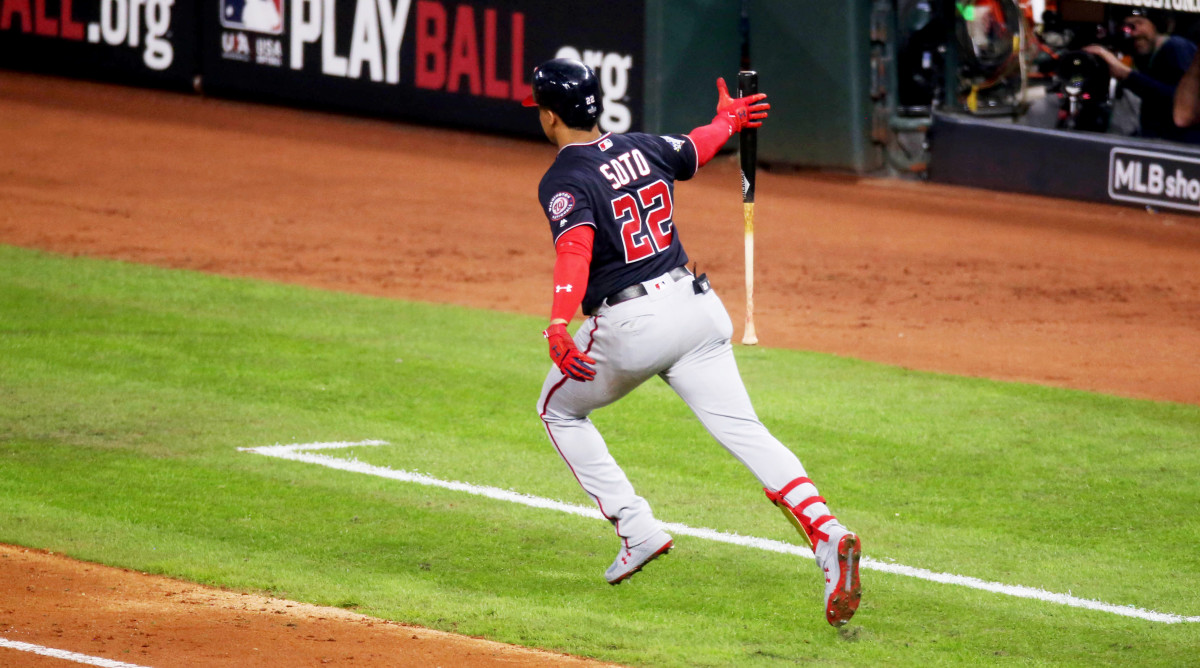No Apologies Needed: Soto, Bregman Home Run Celebrations Energize Baseball's Grandest Stage


HOUSTON —Baseball’s written rules offer 162 pages of information to parse, discuss, review and protest. To debate just one sheet per game would take an entire season. It all comes out to a level of complexity and esotericism that’s matched only by the rules’ phantom twin—the unwritten rules, the traditional set of “do” and “do not” that determines which behavior is permissible and which needs to be policed.
Game 6 of the World Series had an unusually heavy focus on the written rules, with an interference call that sparked controversy and halted play for several minutes in the seventh inning. Before that, however, there was a similarly intense spotlight on their unwritten brethren.
In the first inning, Astros third baseman Alex Bregman launched a homer to left to give Houston the lead. It was a moment that could reasonably justify a little celebration: Game 6 of the World Series, potential clinching contest, home run to put the team ahead. Any of those factors could individually merit some emotion, let alone all of them at once. So Bregman got creative with it. Instead of the customary bat-flip—or perhaps one of its variations, such as the bat toss or bat spike—he did the opposite. He held onto his bat, all the way to first base, a move that may look casual in a vacuum but looked unprecedentedly fierce in context.
Alex Bregman would not let go of that bat 😤
— SI MLB (@si_mlb) October 30, 2019
(via @MLB) pic.twitter.com/m0UBLjUxVS
The Nationals got their chance to match it in the top of the fifth. Adam Eaton had just tied the game with a solo shot. So Juan Soto stepped to the plate with two outs, none on and an opportunity to take the lead. Astros starter Justin Verlander—tiring at this point after running up his pitch count in the previous two frames—missed high with his fastball once, twice, then again. Soto fouled one off. The count was 3-1, and Soto, naturally, was looking for another heater.
“All the way,” he grinned afterward. “All the way.”
He got it. He connected with the sort of intensity that calls to mind the phrase light-tower power, except that this did not seem simply destined for the light tower, this seemed like it was itself the light. It was the truth. It hung in the air for a small eternity and landed in the upper deck with a sense of certitude. The Nationals had the lead. They would not turn it back over for the rest of the game. And Soto, too, held on to his bat, all the way to first base.
💥 Homer, crushed
— SI MLB (@si_mlb) October 30, 2019
😶 Bat, carried
Juan Soto gives the Nats the lead 😮
(via @MLB) pic.twitter.com/KYZXTfhiSG
It was an electric affirmation of MLB’s own postseason motto: We Play Loud. One dramatic statement had been matched by another; these were equal punctuation marks to near-equally thrilling sentences. It was exactly what baseball has supposedly been trying to market here. These were young players, unabashedly fun, celebrating their performance on the game’s grandest stage. It was great play and better entertainment. Unless, of course, it was just an egregious violation of the unwritten rules—which was the perspective of both managers.
“He shouldn't carry the bat past first base,” Astros skipper A.J. Hinch said when asked about Bregman. “Soto shouldn't carry it to first base, either.”
“We didn't like it,” Nationals manager Dave Martinez said when asked the same question. “And the fact that Soto did it, I'll be quite honest with you, I didn't like it when he did it, as well. It's a conversation I'll have with Juan. That's not who we are. I mean, if he feels like he wants to carry the bat all the way to first base, then that's him. But I don't like when our guys do it.”
Bregman felt that he had to apologize, which he did several times after the game. “I just got too excited, and I apologize to their team, my teammates, everybody,” he offered. When asked if Soto should have mimicked him, Bregman said he “deserved it.”
But Soto did not see it as an act of mockery or spite. To him, it had felt like the opposite: It was admiration.
“I just saw Bregman doing it, and I wanted to do the same thing. I was like, ‘Oh, that’s really cool,’” Soto said. “I wanted to do it, too.”
What was the 21-year-old thinking when he hit the go-ahead home run in Game 6 of the World Series—a question in which each noun raises the stakes even more than the previous one? “I just wanted to enjoy it.” So he carried his bat. He was enjoying it.
“Knowing Soto, I don’t think there was any malice behind it,” said Nationals closer Sean Doolittle, who openly identifies as pro-bat flip. “And playing against Bregman for a long time, I don’t think there was any malice behind what he did, either. There’s just a lot of emotion in the game… Those are two exciting young players. I thought it was fun.”
It was exactly what baseball claims to want. We Play Loud is, after all, the sequel to MLB’s previous playoff slogan, Let The Kids Play. In a sense, this was both. The kids played, not with any ridicule or cruelty or even any particular sense of flash, but with some understated cool. They carried their bats. Away from Nationals Park and Theodore Roosevelt, Bregman and Soto spoke softly and carried a big stick. It was arguably far less showy than a dramatic bat-flip or chest thump or crotch grab. Really, if this was playing loud, it was actually rather quiet.
So, let the kids play.
